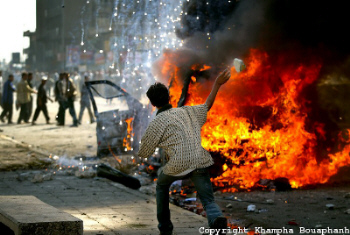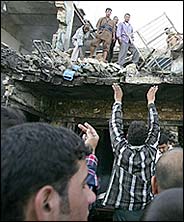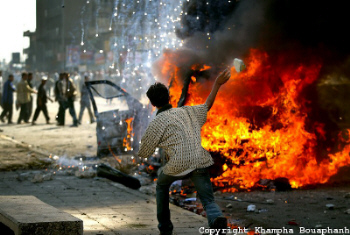Gunmen blasted their way into government offices in central Iraq on Tuesday, with two car bombs and suicide blasts that killed seven people.
 Gunmen blasted their way into government offices in central Iraq on Tuesday with two car bombs and suicide blasts that killed seven people and mirrored a similar March raid claimed by Al-Qaeda.
Gunmen blasted their way into government offices in central Iraq on Tuesday with two car bombs and suicide blasts that killed seven people and mirrored a similar March raid claimed by Al-Qaeda.
The gunmen involved in the attack in Diyala's provincial capital of Baquba exchanged gunfire with Iraqi security forces, holding them at bay, and took hostages in the siege that lasted nearly three hours.
Large numbers of Iraqi police and soldiers were deployed to the scene, with military helicopters hovering overhead and periodically firing onto the building during the siege, AFP reported.
The attack, in which 17 people were wounded, raises concerns over the capabilities of Iraq's security forces, with just months to go before US soldiers must leave the country under the terms of a bilateral security pact.
Insurgents set off two car bombs against the perimeter wall of the provincial government compound at about 06:30 GMT, before the militants stormed it, and set off twin suicide blasts inside the building itself.
Iraqi security forces then surrounded the compound and imposed a city-wide curfew, with security officials only reporting the mayhem over when a final attacker was captured wounded.
Ahmed Alwan, a doctor at Baquba's main hospital, and an official at Diyala's security command centre both said seven people were killed and 17 wounded. He said four policemen were among the dead.
"Special forces from police and army managed to end the raid," Iraqi Army spokesman Major General Mohammed al-Askari told AFP.
 Another security official had initially said dozens of gunmen took part in the raid, but Baquba police later said as few as five may have been involved.
Another security official had initially said dozens of gunmen took part in the raid, but Baquba police later said as few as five may have been involved.
"I saw seven armed men inside the building myself, but I could also hear gunfire in other places as well," said Saleh al-Umawi, a journalist who witnessed the attack.
"Some of them were dressed in normal civilian clothes, and others were dressed in black and had their faces covered," he said.
Tuesday's violence came as Diyala's provincial council held its weekly meeting, and closely mirrored a similar March 29 attack, claimed by Al-Qaeda, on Salaheddin governorate offices in Tikrit that left 58 people dead.
That attack saw gunmen swarm the provincial government building after a suicide bomber cleared the way. Security reinforcements that arrived 20 minutes later were met by a car bomb, and for more than five hours, the gunmen had kept security forces at bay.
Diyala province, which is of Sunni majority but with a substantial Shiite population, lies north of Baghdad and was a stronghold of Al-Qaeda during the peak of sectarian violence in Iraq in 2006 and 2007.
Unrest has declined in the province and nationwide since that time, but Diyala remains one of Iraq's most dangerous regions.
Attacks have been on the rise, however, since the beginning of the year, according to private security firm AKE Group. It said last week that violent incidents averaged more than 10 per day in May, up from four-to-five daily attacks in January.
Some 45,000 US troops remain stationed in Iraq, but must all withdraw by the end of the year. American officials have been pressing their counterparts in Baghdad to decide quickly whether or not to extend the military presence beyond year-end.
